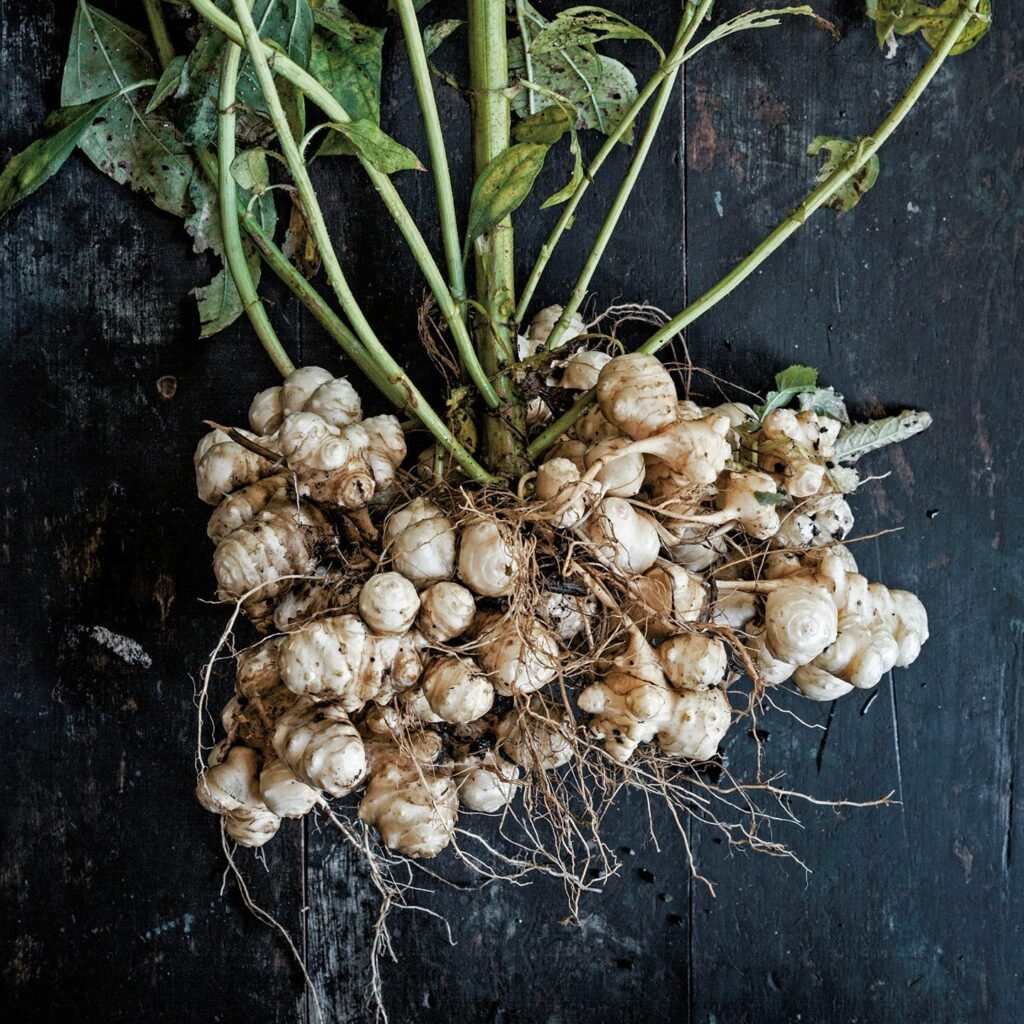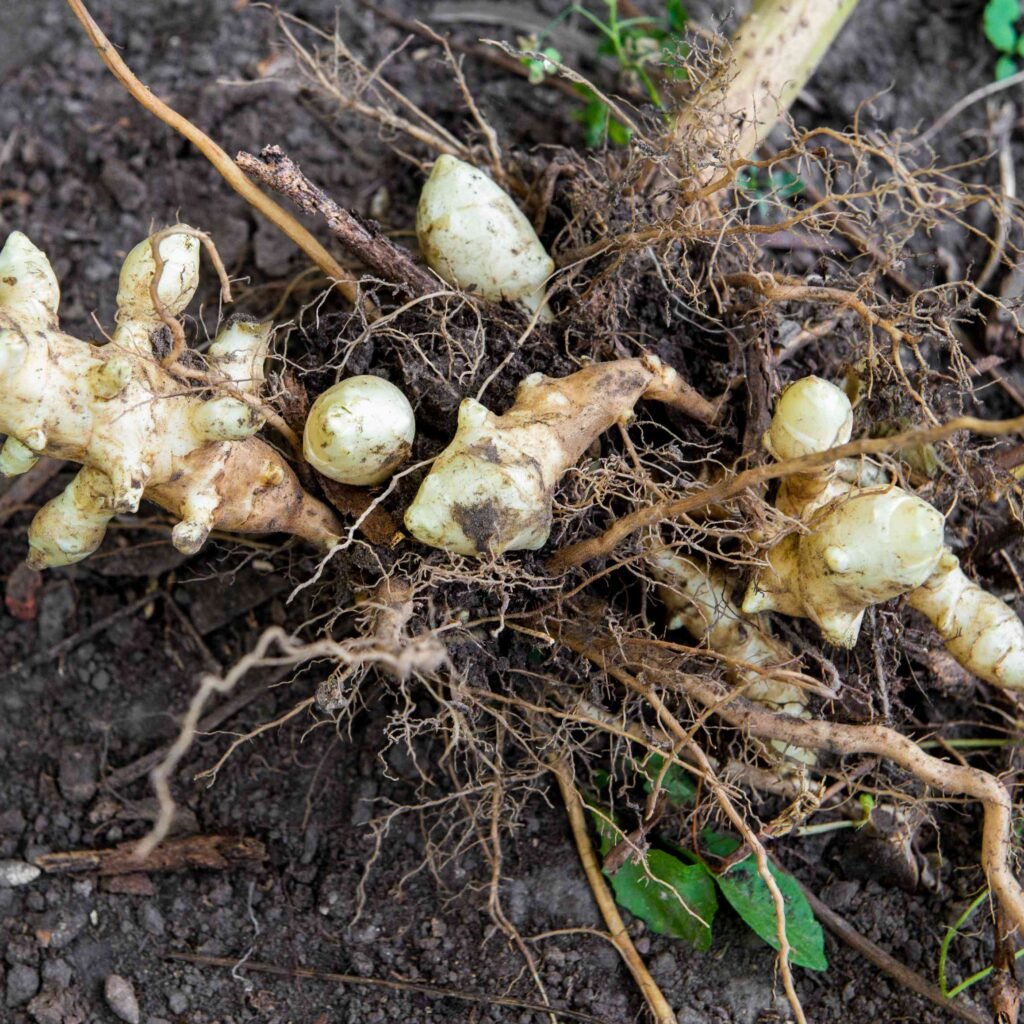Jerusalem artichoke, often called sunchoke, is a nutrient-packed, versatile root vegetable that is slowly gaining popularity in American kitchens. Despite its misleading name, it is not related to Jerusalem nor an artichoke—it is actually a species of sunflower. Known for its sweet, nutty flavor and crisp texture, Jerusalem artichoke can be roasted, mashed, sautéed, or eaten raw, making it a fantastic addition to soups, salads, and side dishes.
This comprehensive guide will take you through everything you need to know about Jerusalem artichokes, including nutritional benefits, health perks, preparation tips, and creative recipes.
What is a Jerusalem Artichoke?

The Jerusalem artichoke is a tuberous root vegetable that grows underground. Its knobby, irregular shape may resemble ginger, but inside, it has a creamy white flesh with a slightly sweet and nutty flavor. Native to North America, it has been used for centuries by Native Americans and early European settlers.
It is a cool-season crop, often harvested in fall and winter. Jerusalem artichokes can be enjoyed raw, roasted, sautéed, pureed, or pickled, offering incredible versatility for home cooks.
Pro Tip: When choosing Jerusalem artichokes, look for firm, unblemished tubers. Avoid soft or shriveled pieces, as they may be past their prime.
Nutritional Benefits of Jerusalem Artichokes

Jerusalem artichokes are more than just tasty—they are nutritional powerhouses:
- Low in Calories: Approximately 73 calories per 100 grams.
- High in Fiber: Rich in inulin, a prebiotic fiber that supports gut health.
- Vitamin C: Boosts immunity and supports collagen production.
- Iron: Contributes to healthy red blood cells and oxygen transport.
- Potassium: Helps regulate blood pressure and supports heart health.
- Antioxidants: Reduce oxidative stress and inflammation.
Pro Tip: Raw Jerusalem artichokes retain the most nutrients, especially the prebiotic fiber inulin, which supports digestive health and beneficial gut bacteria.
Health Benefits of Jerusalem Artichokes

- Supports Digestive Health: The inulin fiber feeds good gut bacteria, improving digestion and regularity.
- Boosts Immunity: Vitamin C strengthens the immune system.
- Supports Heart Health: Potassium helps regulate blood pressure, while fiber may reduce cholesterol levels.
- Weight Management: High fiber content helps keep you full longer, making it ideal for low-calorie meals.
- Blood Sugar Control: Inulin helps regulate blood sugar levels, making it suitable for diabetics.
Pro Tip: Introduce Jerusalem artichokes gradually if eating raw, as high inulin content may cause gas or bloating for sensitive digestive systems.
How to Prepare Jerusalem Artichokes

Jerusalem artichokes are versatile and can be prepared in numerous ways:
- Raw: Peel and slice thinly for salads or crudité platters.
- Roasted: Toss with olive oil, salt, and herbs, then roast for a sweet, caramelized flavor.
- Mashed: Boil and mash with butter or cream for a delicious alternative to potatoes.
- Sautéed: Cook with garlic, onions, or other vegetables for a quick side dish.
- Soups: Blend cooked Jerusalem artichokes into creamy soups for a nutty flavor.
- Pickled: Slice and pickle for a tangy snack or salad topping.
Pro Tip: Scrub tubers gently to remove dirt. Peeling is optional for small, tender tubers, but larger ones may benefit from peeling for smoother texture.
Jerusalem Artichoke Recipes to Try

Here are some delicious ways to enjoy Jerusalem artichokes:
1. Roasted Jerusalem Artichokes
- Toss cleaned and cut tubers with olive oil, salt, pepper, and rosemary.
- Roast at 400°F for 25–30 minutes until golden and tender.
- Serve as a side dish with roasted meats or other root vegetables.
2. Jerusalem Artichoke Soup
- Sauté onions, garlic, and chopped Jerusalem artichokes in olive oil.
- Add vegetable or chicken broth and simmer until tender.
- Blend until creamy, season with salt, pepper, and thyme.
3. Mashed Jerusalem Artichokes
- Boil peeled tubers until tender.
- Mash with butter, cream, and a pinch of nutmeg.
- Serve as a low-carb alternative to mashed potatoes.
4. Jerusalem Artichoke Salad
- Thinly slice raw tubers and toss with lemon juice, olive oil, and fresh herbs.
- Add shaved Parmesan or toasted nuts for extra flavor.
5. Sautéed Jerusalem Artichokes with Garlic
- Slice tubers thinly and sauté in olive oil with garlic and thyme.
- Cook until golden and slightly crispy.
- Season with salt, pepper, and a squeeze of lemon.
Pro Tip: Pair Jerusalem artichokes with other root vegetables like carrots, parsnips, or sweet potatoes for a colorful and flavorful dish.
Storage Tips for Jerusalem Artichokes
Proper storage ensures maximum freshness:
- Store unwashed tubers in a cool, dark, and ventilated place.
- Refrigerate in a plastic bag for up to 2–3 weeks.
- Avoid storing near ethylene-producing fruits such as apples or bananas to prevent premature spoilage.
- Peeled or cut tubers can be stored in water in an airtight container for 1–2 days.
Pro Tip: For long-term storage, Jerusalem artichokes can be blanched and frozen for later use in soups or roasted dishes.
Why Jerusalem Artichokes are Popular in American Kitchens
Jerusalem artichokes are becoming more popular in the U.S. due to:
- Health-Conscious Eating Trends: Low in calories, high in fiber, and prebiotic-rich.
- Versatility in Cooking: Can be eaten raw, roasted, mashed, sautéed, or in soups.
- Unique Flavor Profile: Sweet, nutty, and earthy taste that complements many dishes.
- Low-Carb and Diabetic-Friendly: Ideal for those managing blood sugar.
- Creative Culinary Uses: Perfect for fusion recipes, grain bowls, or holiday sides.
Pro Tip: Use Jerusalem artichokes in creative ways such as chips, purees, or raw slaws for healthy snacks and sides.
Fun Facts About Jerusalem Artichokes
- Despite its name, Jerusalem artichoke is not related to Jerusalem nor to artichokes—it is a type of sunflower.
- The vegetable has been cultivated in North America for centuries by Native Americans.
- Jerusalem artichokes are high in inulin, a natural prebiotic fiber.
- Both raw and cooked tubers are edible and nutritious.
- They can be stored for several weeks in a cool environment, making them ideal for winter cooking.
Conclusion: Why You Should Add Jerusalem Artichokes to Your Diet
Jerusalem artichokes are a nutritious, versatile, and flavorful root vegetable that deserves a place in your kitchen. Its sweet, nutty taste and crunchy texture make it ideal for a wide range of dishes, from raw salads and slaws to roasted sides, creamy soups, and mashed alternatives to potatoes.
Including Jerusalem artichokes in your diet offers:
- High fiber, low-calorie nutrition for healthy weight management.
- Prebiotic benefits to support gut health and immunity.
- Culinary versatility for both everyday meals and special occasions.
Whether you’re looking to eat healthier, experiment with new vegetables, or impress your guests with unique flavors, Jerusalem artichokes are a delicious, nutritious, and underappreciated root vegetable worth exploring.





